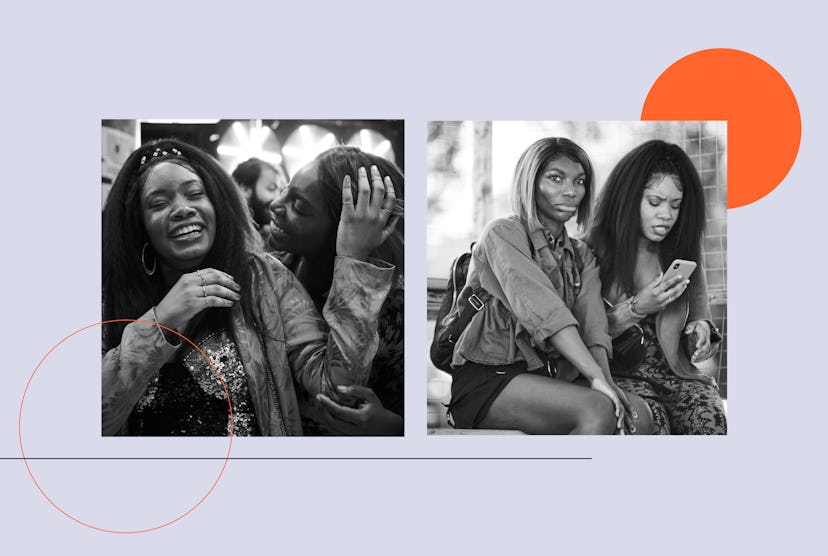TV & Movies
The Defining Relationship On I May Destroy You Isn't Romantic
In this week's episode, Arabella and Terry's friendship is tested.

“Your birth is my birth, your death is my death.” I May Destroy You’s Arabella and Terry have been trading these ten words back and forth all season. They’re a private call and response, an adult iteration of the secret handshake that sometimes feels just as performative. At Terry’s birthday party, Arabella uses them to wind up her toast, a celebratory cry into the year ahead. Occasionally, the words serve the purposes of a mantra, a centering shorthand for the respite of intertwined fates. For two women with loose family attachments and professional lives drifting from gig to gig against the background of a mammoth city that runs on their energy but offers them little in return, they are a pledge of allegiance: The smallest unit of their existence is the dyad. Between them, there’s no such thing as being alone.
The words are also, as a viewer, hard to fully invest in. Didn’t we all make up secret handshakes we no longer remember with intimate friends we now only glimpse on Instagram? “Your birth is my birth, your death is my death” is a stirring credo, especially between adult women, but might it also be accidentally vacuous — at worst, a poetic hyperbole and, at best, plain naive? Since the season premiere, Bella and Terry have been tested by sexual deceptions, professional defeats, and cash flow problems. Like clockwork, they find support in the refrain of each other. But in the tenth episode of the series, the test is finally between them.
In the most recent installment, Arabella learns what viewers have known for weeks: that Terry told their friend Simon it was OK to leave Arabella alone at the bar on the night she survived a drug-facilitated rape. Then, as Arabella starts to recall her assault, Terry instructed Simon to lie and say he walked her home. These lies prove especially destabilizing as Bella struggles to reconstruct her memories, but Terry never comes clean. Even when Bella eventually discovers the truth, it’s from Simon.
It's an unflinching commitment to someone you know has the power to let you down and a rending portrayal of female friendship as something as risky and rewarding as romantic love.
It’s been remarkable to watch a show treat friendship between adult women with the seriousness most reserve for romantic devotion. Terry has been completely dedicated to Arabella’s recovery, organizing self-care and attending doctor’s appointments. She’s given generously of her time and patience and money, with scarce hint of fatigue. But the realization that she’s not been fully honest with Bella casts doubt over the rest of the season. Is her devotion a feature of their friendship or a symptom of her guilt?
The episode’s forward action is interrupted with scenes of Terry and Arabella as teenagers, conspiring over boys and lying to their parents. They’re together on the afternoon Arabella learns of her father’s infidelity. She doesn’t tell Terry and, by the time she’s an adult, it seems she’s repressed the memory entirely. But if the implication is that there have always been pockets of space between the friends, then it’s the same distance at which Arabella holds even herself. There are things you cannot admit even to your own bones. For everything else, Bella's always had Terry.
When she eventually confronts Terry about what Simon told her, it’s the gentlest and most tender we’ve ever seen Arabella. She doesn’t blink. “You’re amazing,” she assures her friend, both their eyes wet. “Your birth is my birth, your death is my death,” they say to each other for the hundredth and, in this new way, for the first time. Just like the jocular characters who exchange it, the vow has been stripped of its bravado. What’s left is an unflinching commitment to someone you know has the power to let you down and a rending portrayal of female friendship as something as risky and rewarding as romantic love.